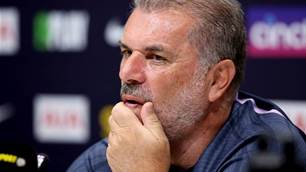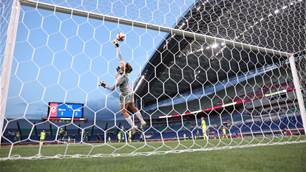David Gold believes West Ham's chances of taking over the Olympic Stadium after the London 2012 Games have improved.
The Hammers, under new co-owners Gold and David Sullivan and vice-chairman Karren Brady, have expressed interest in relocating from Upton Park to the 80,000-capacity arena in Stratford but have found their overtures played down by Olympics chiefs.
Olympics minister Tessa Jowell and London 2012 chief Lord Coe insist keeping the stadium as a grand prix athletics stadium was one of the reasons London's bid for the Games was successful.
But Gold remains optimistic.
"I'm sensing an easing of the stance that it should be a legacy to athletics," the Hammers co-owner told BBC Radio Five Live.
"We have to be more pragmatic. Do we want to have a stadium like we have at Crystal Palace which just deteriorated and rotted away because it wasn't sustainable?
"We believe there is a serious possibility that we could strike a deal that would take West Ham to the Olympic Stadium.
"If that can be done, we would have a super stadium that could take the club to the next level."
Gold has even suggested West Ham could build a separate athletics stadium to support their move to the main arena.
"One other possibility is to abandon the athletics idea altogether and maybe build a small athletics stadium that can be used forever," he said.
"Not as an Olympic athletics stadium but a regional stadium with seating facility commensurate to their requirements, which would be about 5,000."
Former Mayor of London Ken Livingstone, who was in office when the city won the right to host the 2012 Games, has warned the Hammers that the main obstacle to their hopes of moving into the Olympic stadium will be the International Olympic Committee themselves.
"The stadium was designed with the idea that perhaps a second or third division football or rugby team would go in there but the primary use would be athletics," he told BBC Radio 5 Live.
"Because it is a legally binding contract, you have got to get the International Olympic Committee to agree, and their interest is athletics, not football."
Olympics minister Tessa Jowell and London 2012 chief Lord Coe insist keeping the stadium as a grand prix athletics stadium was one of the reasons London's bid for the Games was successful.
But Gold remains optimistic.
"I'm sensing an easing of the stance that it should be a legacy to athletics," the Hammers co-owner told BBC Radio Five Live.
"We have to be more pragmatic. Do we want to have a stadium like we have at Crystal Palace which just deteriorated and rotted away because it wasn't sustainable?
"We believe there is a serious possibility that we could strike a deal that would take West Ham to the Olympic Stadium.
"If that can be done, we would have a super stadium that could take the club to the next level."
Gold has even suggested West Ham could build a separate athletics stadium to support their move to the main arena.
"One other possibility is to abandon the athletics idea altogether and maybe build a small athletics stadium that can be used forever," he said.
"Not as an Olympic athletics stadium but a regional stadium with seating facility commensurate to their requirements, which would be about 5,000."
Former Mayor of London Ken Livingstone, who was in office when the city won the right to host the 2012 Games, has warned the Hammers that the main obstacle to their hopes of moving into the Olympic stadium will be the International Olympic Committee themselves.
"The stadium was designed with the idea that perhaps a second or third division football or rugby team would go in there but the primary use would be athletics," he told BBC Radio 5 Live.
"Because it is a legally binding contract, you have got to get the International Olympic Committee to agree, and their interest is athletics, not football."
Copyright (c) Press Association
Related Articles

Postecoglou looking to A-League to 'develop young talent'
.jpeg&h=172&w=306&c=1&s=1)
Big change set to give Socceroos star new lease on life in the EPL













